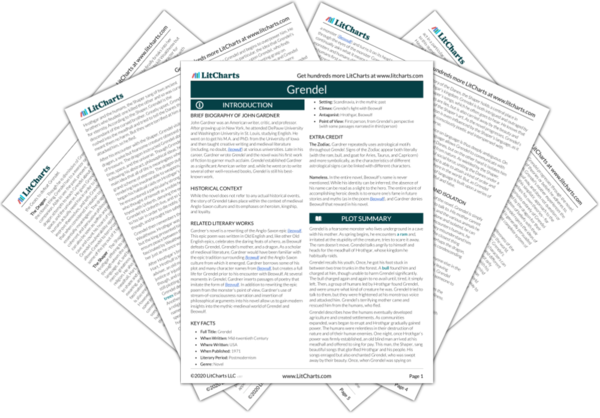Throughout the novel, Grendel and other characters attempt to answer large questions concerning nature and time. Grendel speaks to nature and at times wonders if there is some kind of spirit in nature (as the Danes believe), but ultimately concludes that the world is made up of a series of mindless, mechanical processes. But then where do Grendel and the Danes fit into this understanding of nature? Is Grendel also simply carrying out a natural process, driven to act by his desires, or can he choose to act in a particular way that might mean something? The answer to this question depends greatly on one’s perspective of time. Having been around for much longer than the Danes, Grendel is able to laugh at their narrative of history and understanding of the world.
But the dragon—who can see past, present, and future—finds Grendel’s perspective equally laughable. From the dragon’s grand perspective, the world is simply “a swirl in the stream of time,” and “a temporary gathering of bits.” In the big picture, there is no order or meaning to the random chaos of nature. Regardless of whether one agrees with the ideas of the dragon, the novel ultimately suggests that one’s understanding of nature is greatly dependent on one’s perspective in time. How someone perceives his or her relation to the rest of the world depends on whether he or she is considering the world in terms of an individual’s lifetime, the history of a particular people, the history of the entire human race, or all of eternity.
Nature and Time ThemeTracker

Nature and Time Quotes in Grendel
“Why can’t I have someone to talk to?” I said. The stars said nothing, but I pretended to ignore the rudeness.

Unlock explanations and citation info for this and every other Grendel quote.
Plus so much more...
Get LitCharts A+“A swirl in the stream of time. A temporary gathering of bits, a few random dust specks, so to speak—pure metaphor, you understand—then by chance a vast floating cloud of dustspecks, an expanding universe—” He shrugged. “Complexities: green dust as well as the regular kind. Purple dust. Gold. Additional refinements: sensitive dust, copulating dust, worshipful dust!”
The ultimate evil is that Time is perpetual perishing, and being actual involves elimination. The nature of evil may be epitomized, therefore, in two simple but horrible and holy propositions: ‘Things fade’ and ‘Alternatives exclude.’
I recall something. A void boundless as a nether sky. I hang by the twisted roots of an oak, looking down into immensity. Vastly far away I see the sun, black but shining, and slowly revolving around it there are spiders. I pause in my tracks, puzzled—though not stirred—by what I see. But then I am in the woods again, and the snow is falling, and everything alive is fast asleep. It is just some dream. I move on, uneasy; waiting.











